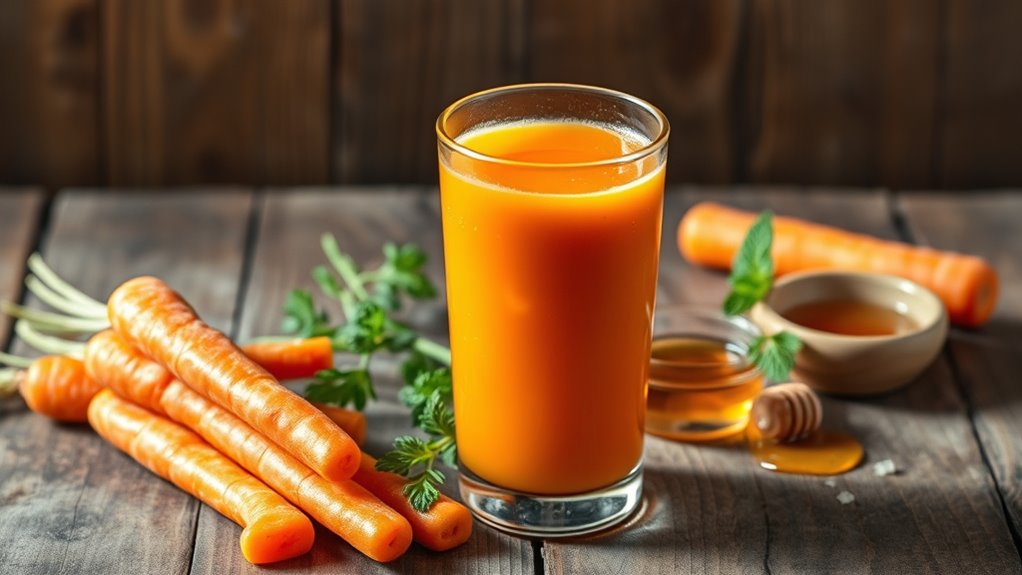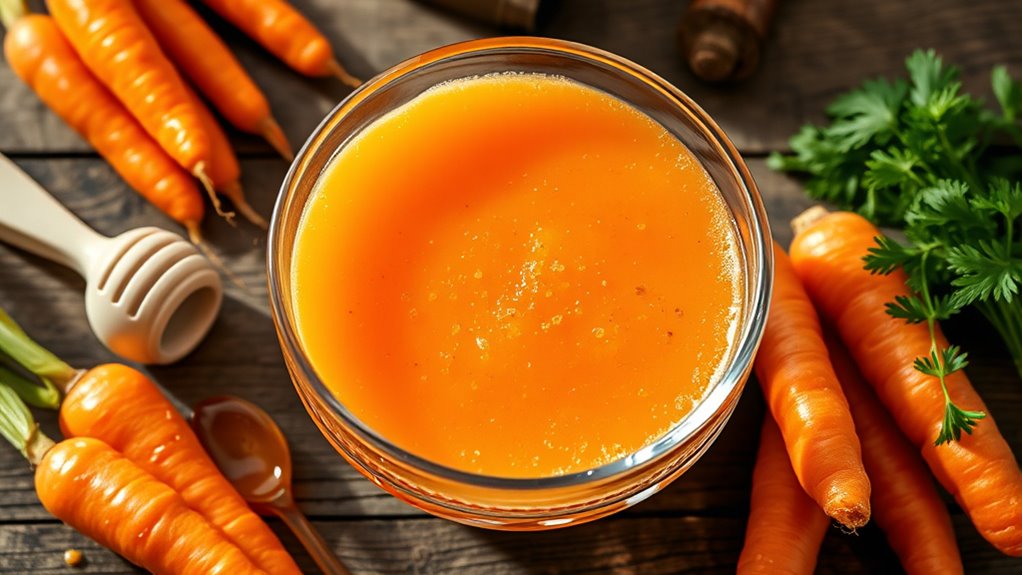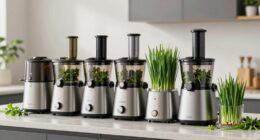To make flavorful, nutrient-packed carrot juice, start with fresh carrots and choose your extraction method—blending, centrifugal, or cold-pressing—based on your equipment. For a sweeter taste, add apples or oranges; ginger and lemon give a zesty kick, while cucumbers or celery add freshness. High-quality juicers improve yield and preserve nutrients. Experiment with pairings and enjoy your juice chilled for maximum refreshment—if you explore further, you’ll discover even more ways to enhance your carrot juice experience.
Key Takeaways
- Carrot juice has a naturally sweet, earthy flavor that pairs well with fruits like apple, orange, or lemon, and vegetables like celery and cucumber.
- Extraction methods (blender, centrifugal, or cold-press juicer) affect juice yield and nutrient retention, with masticating juicers providing more nutrients.
- Adding ingredients like ginger, lemon, or citrus enhances flavor complexity and offers health benefits.
- Fresh carrots produce the best-tasting, most nutritious juice with higher yields, especially when using high-quality juicers.
- Serve carrot juice chilled for refreshment and incorporate into breakfast or smoothies for optimal health benefits.

Carrot juice is a popular and nutritious beverage you can easily prepare at home. Its vibrant orange color and natural sweetness make it a favorite among health enthusiasts and casual drinkers alike. When you make carrot juice yourself, you gain control over the ingredients, ensuring a fresh, pure product without added preservatives or sugars. One of the main reasons people turn to carrot juice is for its impressive nutritional benefits. It’s packed with beta-carotene, which your body converts into vitamin A, essential for good vision, immune function, and skin health. Carrots also provide vitamins C and K, potassium, and antioxidants that combat free radicals. Incorporating freshly made carrot juice into your diet can support overall wellness and boost your immune system, especially during cold seasons.
To get the most out of your carrots, it’s helpful to understand juice extraction techniques. The right method can maximize nutrient retention and yield a smoother, more flavorful juice. If you’re using a blender, chop the carrots into small pieces and blend until smooth, then strain the mixture through a fine mesh or cheesecloth to separate the juice from the pulp. Alternatively, a centrifugal juicer quickly extracts juice by spinning the carrots at high speeds, separating the liquid from the solids efficiently. A masticating or cold-press juicer, on the other hand, crushes and presses the carrots slowly, preserving more nutrients and enzymes, which enhances the nutritional benefits of your juice. Whichever technique you choose, fresh carrots will give you the best taste and health benefits. Keep in mind that the extraction process influences the juice’s yield, so using a high-quality juicer might be worth the investment if you plan to make carrot juice regularly.
The versatility of carrot juice extends to its flavor and pairings. Its naturally sweet and earthy profile pairs well with other fruits and vegetables. For a more complex taste, add a splash of apple or orange juice, which enhances sweetness and adds a citrus note. Ginger can provide a spicy kick, while a touch of lemon can brighten the flavor. You might also blend in some celery or cucumber for added freshness and hydration. As for pairings, carrot juice complements breakfast dishes like oatmeal, yogurt, or whole-grain toast. It also works well as a revitalizing midday drink or a component in smoothies. When served chilled, it’s particularly satisfying on warm days. Experimenting with flavor combinations allows you to customize your carrot juice experience, making it both nutritious and delightful. Incorporating nutrient retention techniques can further enhance the health benefits of your homemade juice.
Frequently Asked Questions
Can Carrot Juice Be Made From Organic Carrots?
Yes, you can definitely make carrot juice from organic carrots. Organic farming practices avoid synthetic pesticides and fertilizers, so your juice will have fewer pesticide residues. When you choose organic carrots, you’re opting for a healthier, more natural option that preserves the true flavor of the carrots. Just wash them thoroughly to remove any dirt, and you’ll enjoy fresh, pure carrot juice free from chemical worries.
How Long Does Homemade Carrot Juice Last?
Think of your homemade carrot juice as a fleeting rainbow—beautiful but delicate. You can expect it to last 2 to 3 days when stored in an airtight container in the fridge. To preserve its vibrant flavor, use proper preservation methods like refrigeration quickly after juicing. Keep in mind, flavor degradation accelerates over time, so enjoy it fresh to savor the full sweetness and nutrients.
What’s the Best Way to Store Leftover Carrot Juice?
To store leftover carrot juice, transfer it to an airtight container and refrigerate promptly. Use storage tips like filling the container to the top to minimize air exposure. Keep your juice chilled at or below 40°F, and consume within 24-48 hours for best freshness. Make sure to shake or stir before drinking, and avoid leaving it out at room temperature to prevent spoilage.
Are There Any Health Risks Associated With Drinking Carrot Juice?
Drinking carrot juice can pose some health risks, especially if you have allergies or sensitivities. You might experience allergy risks like itching or swelling. Additionally, consuming large amounts could interfere with nutrient absorption, particularly of vitamin A, leading to potential toxicity. To stay safe, enjoy it in moderation and consult your doctor if you notice any adverse reactions or have allergies, ensuring you benefit without risking your health.
How Does Carrot Juice Compare to Other Vegetable Juices?
You’ll find that carrot juice has a unique nutritional comparison and flavor profile compared to other vegetable juices. It’s rich in beta-carotene, vitamin A, and antioxidants, making it a healthy choice. Its sweet, earthy flavor stands out, often blending well with apple or ginger. While some veggie juices like beet or kale offer different nutrients, carrot juice provides a balanced, naturally sweet taste that appeals to many, making it a versatile option in your diet.
Conclusion
Now that you know how to make and enjoy carrot juice, you’ll love its natural sweetness and vibrant flavor. Did you know that carrots contain over 13 different carotenoids, which boost your immune system? Incorporating carrot juice into your routine not only tastes great but also supports your health. So, grab some fresh carrots, experiment with pairings, and enjoy the delicious benefits of this nutritious drink every day!










